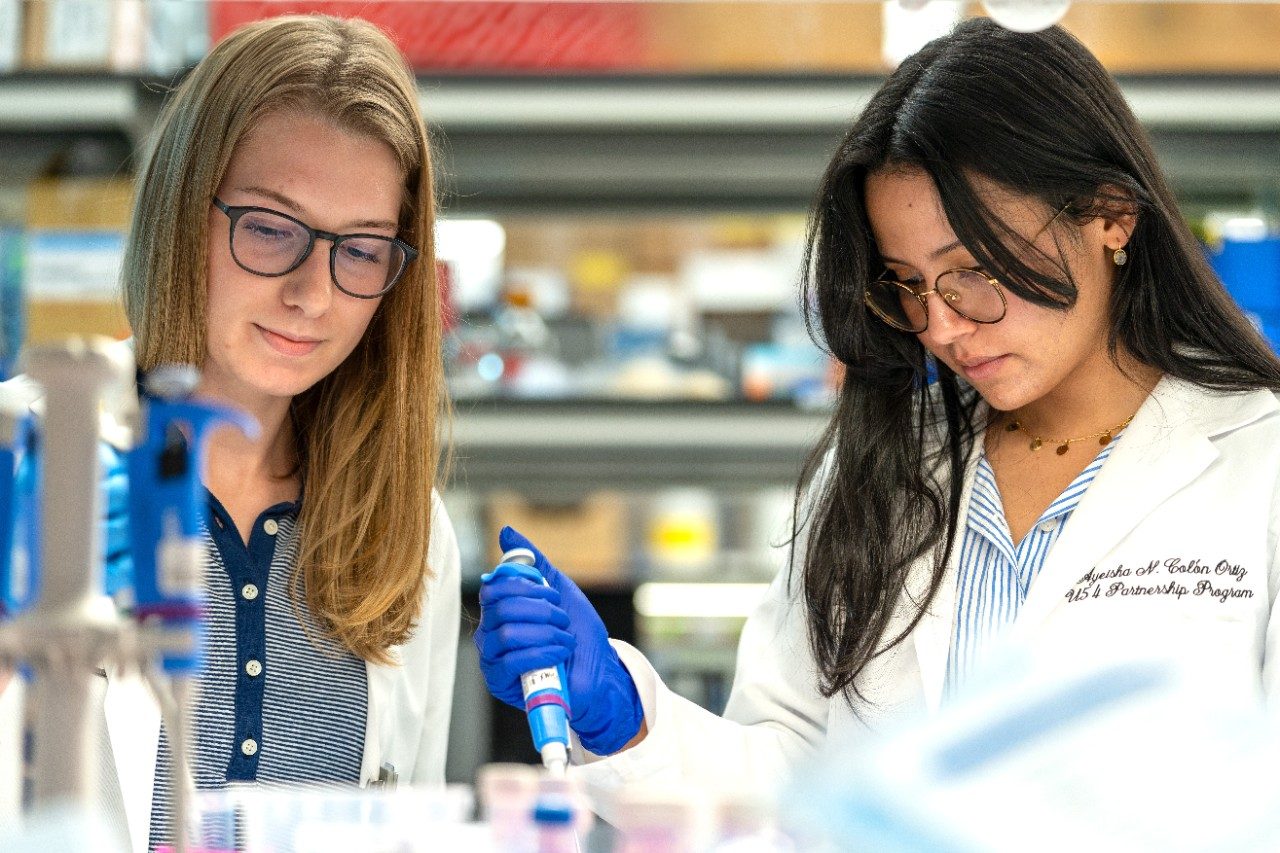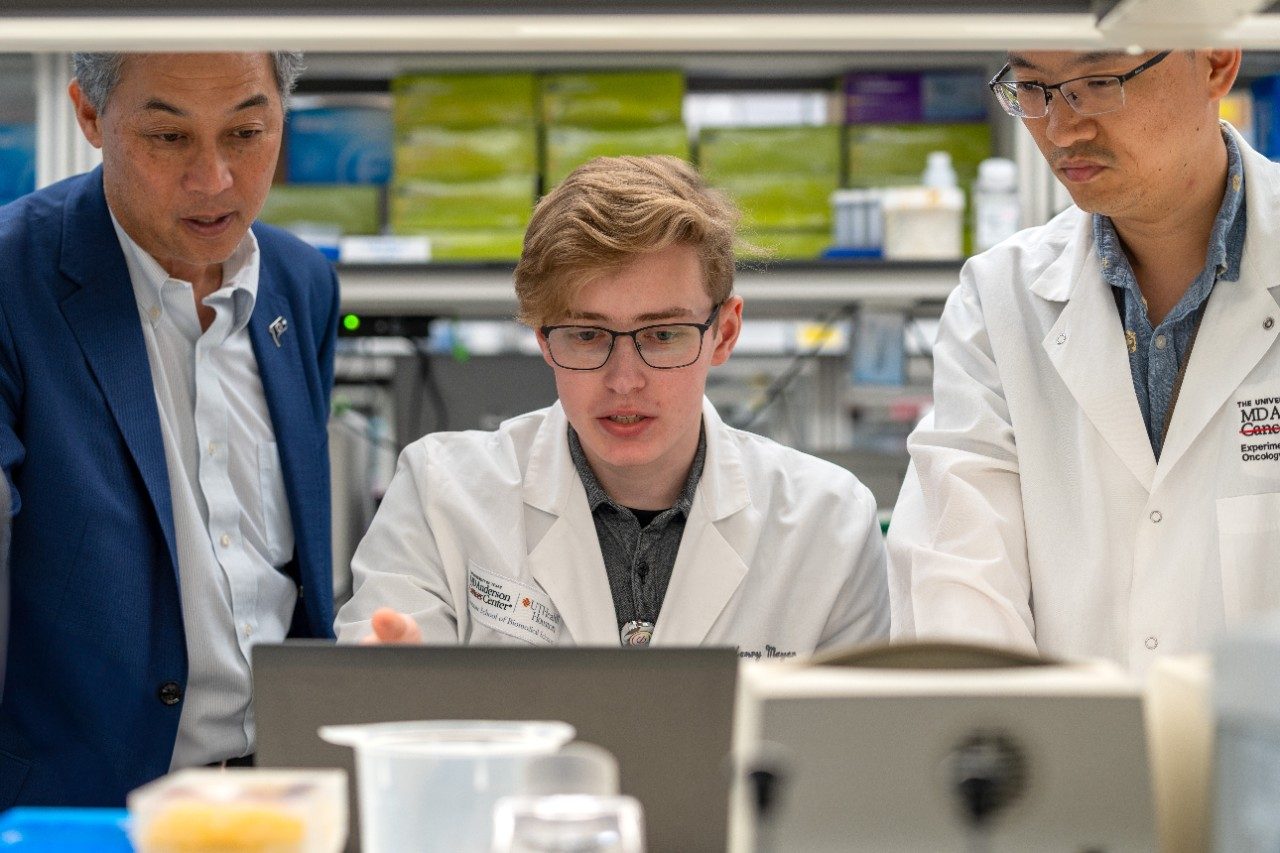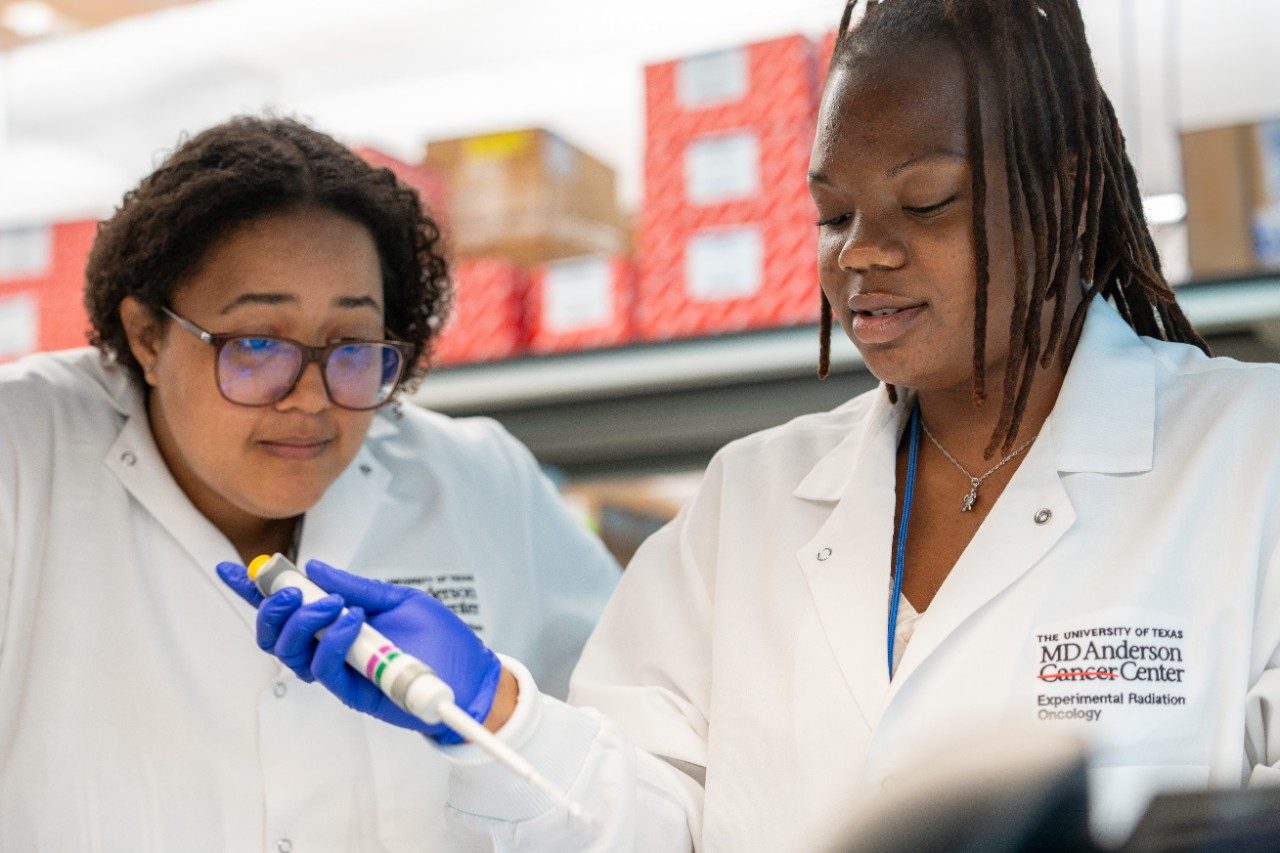
Koong Laboratory
Albert C. Koong, M.D., Ph.D.
Principal Investigator
- Departments, Labs and Institutes
- Labs
- Koong Laboratory
Areas of Research
- Pancreatic Cancer
- Radiation Therapy
- Drug Development
- Immunotherapy
The major focus of the Koong Laboratory is to investigate tumor microenvironment, especially hypoxia-regulated signaling pathways that contribute to tumor growth and resistance to anti-cancer therapy.
Our Research
The Koong Lab is supported by an experienced research team. We have previously shown that the IRE1alpha-XBP1 pathway, a key component of the unfolded protein response (UPR), was activated by hypoxia and endoplasmic reticulum (ER) stress. Since identifying IRE1alpha-XBP1 as a potential therapeutic target in cancer, our laboratory has completed a high throughput small molecule screen of >120,000 compounds for inhibitors of this pathway. The current research directions in the lab include:
Targeting the IRE1alpha-XBP1 branch of the UPR: We identified a class of compounds that selectively inhibit IRE1alpha and demonstrate potent anti-cancer activity. We developed several computational biology methods of analyzing the drug screening data to improve the efficiency of drug discovery. We also completed a genome-wide siRNA screen to identify other genes that are required for the activation of IRE1alpha. Studies investigating the mechanisms of IRE1alpha activation will lead to the development of novel cancer therapeutics targeting this pathway.
The role of metabolic cell death in tumor response to radiation therapy (RT): Recently, we also identified a novel regulatory function of IRE1alpha in cellular sensitivity to ferroptosis, an iron-dependent form of non-apoptotic cell death, suggesting that targeting this pathway pharmacologically may be a novel therapeutic approach for alleviating tissue damages due to excessive ferroptosis, as well as for improving cancer therapy (Jiang et al. Nature Communications 2024). We expanded our research to the broader topic of metabolic cell death, cell death due to metabolic imbalances of tumor cells (Mao, et al. Nature Reviews Cancer 2025) including ferroptosis, cuproptosis and disulfdptosis, in tumor responses to treatment, especially RT.
Interplay between hypoxia, Cancer-Associated Fibroblasts (CAFs) and macrophages in PDAC tumor microenvironment: M2 macrophages suppress anti-tumor T cell responses, which leads to favorable conditions for tumor growth. Previously we found that this effect was HIF-2a (HIF2) dependent and could be reversed with a small molecule inhibitor of HIF-2a called PT2399, a preclinical version of belzutifan, an FDA-approved HIF-2a inhibitor for use in VHL-mutant renal cell carcinoma (Garcia et al. Gastroenterology 2022). We are actively working to identify the paracrine factor(s) mediating this polarization effect on macrophages. We envision that by using our combination of in vivo mouse modeling and in vitro cell/organoid culture systems we will determine the role of hypoxia in various cell types within the PDAC tumor microenvironment, with the goal to identify potentially druggable targets, such as the fibroblast-macrophage signaling axis.
Combination of mutant KRAS/pan-RAS inhibition with RT in pancreatic cancer treatment: Dr. Koong's clinical interest is in the treatment of gastrointestinal malignancies, particularly pancreatic cancer (pancreatic ductal adenocarcinoma, or PDAC). He has pioneered the use of stereotactic body radiotherapy (SBRT) or stereotactic ablative radiotherapy (SABR) for pancreatic cancer. The translational focus of the Koong Laboratory is to identify cancer biomarkers that facilitate clinical decision making, as well as more effective therapeutic strategies to improve SBRT. More recently, we have been testing the combination of mutant KRAS/pan-RAS inhibitors in clinical development with SBRT in pre-clinical PDAC models.

An integrated approach for multiomics/multiplex/spatial tumor analysis
We utilize advanced state-of-the-art technological platforms to empower our tumor analysis. Single-cell RNAseq (scRNAseq) provides a snapshot of the relative abundance and transcriptomic profiles of diverse cell types in the tumor microenvironment. Spatial transcriptomics resolves the spatial distribution of the diverse cell types and infer valuable cell-cell interactions. Spatial metabolomics measures the distribution and abundance of metabolites. Multiplex immunostaining like the COMET assay enables spatial evaluation of essential proteomic markers. When integrated, these platforms form a powerful toolset to delineate the complex tumor ecosystem for various research purposes.
Collaborators
-
NCI ARTNet
The NCI Acquired Resistance to Therapy Network (ARTNet) Opens a new window
-
ARTI Center
Acquired Resistance to Therapy and Iron (ARTI) Center
-
Gan Lab
Experimental Radiation Oncology, MD Anderson
-
Lin Lab
Radiation Oncology, MD Anderson
-
David Piwnica-Worms Lab
Cancer Systems Imaging, MD Anderson
-
Dr. Pankaj Singh
The University of Oklahoma Opens a new window

Exploiting metabolic cell death for cancer therapy
Chao Mao, Dadi Jiang, Albert C. Koong & Boyi Gan
Nature Reviews Cancer (2025)
Resistance to cell death is a hallmark of cancer, driving tumour progression and limiting therapeutic efficacy. Metabolic cell death pathways have been identified as unique vulnerabilities in cancer, with ferroptosis being the most extensively studied, alongside the more recently discovered pathways of cuproptosis and disulfidptosis — each triggered by distinct metabolic perturbations. In this Review, we examine the molecular mechanisms and regulatory networks that govern these forms of metabolic cell death in cancer cells. We further examine the potential crosstalk between these pathways and discuss how insights gained and challenges encountered from extensive studies on ferroptosis can guide future research and therapeutic strategies targeting cuproptosis and disulfidptosis in cancer treatment. We highlight the complexity and dual roles of metabolic cell death in cancer and offer our perspective on how to leverage these cell death processes to develop innovative, targeted cancer therapies.

Novel role for IRE1α suggests its therapeutic potential for regulating ferroptosis
Dadi Jiang, Youming Guo, Tianyu Wang, Liang Wang, Yuelong Yan, Ling Xia, Rakesh Bam, Zhifen Yang, Hyemin Lee, Takao Iwawaki, Boyi Gan & Albert C. Koong
Nature Communications (2024)
Recent research led by Dadi Jiang, Ph.D., and Albert Koong, M.D., Ph.D., discovered a novel role for IRE1α in regulating glutathione synthesis, which is crucial for protecting cells from oxidative damage and maintaining tissue health. By controlling the expression of key glutathione biosynthesis regulators, IRE1α can impact cell sensitivity to ferroptosis. These findings suggest that cell sensitivity to ferroptosis can be pharmacologically modulated by IRE1α inhibition, highlighting its therapeutic potential.
2025 Funding
- 1U54CA274220-02, National Cancer Institute (NCI): Acquired Resistance to Therapy and Iron (ARTI) Center, Project 2: Tumor hypoxia promotes acquired resistance to radiation through ferroptosis inhibition
- 1U54CA274220-02, National Cancer Institute (NCI): Acquired Resistance to Therapy and iron (ARTI) Center – Admin Core
- RO1CA266673, National Institute of Health (NIH) National Cancer Institute (NCI): The Role of HIF2 in Pancreatic Ductal Adenocarcinoma
- RO1CA266673, National Institute of Health (NIH) National Cancer Institute (NCI): Preclinical optimization of ultra-high dose rate (FLASH) radiotherapy parameters for translational relevance
Meet the Team
The Koong Lab
Top row: Tianyu Wang, Henry Meyer, Matthew Cribb, Dadi Jiang
4th row: Maya Ferrell, Jasper Chen
3rd row: Nefetiti Mims, Youming Gou, Liang Wang
2nd row: Ling Xia, Tara Fujimoto, Sahar Fattani
Bottom row: Xianzhou Song, Ayeisha Colon Ortiz, Albert Koong, Morgan Green
Dr. Koong and colleagues working in his lab.







Contact Us
Principal Investigator
Albert C. Koong, M.D., Ph.D., FACR, FASTRO
Professor and Head, Division of Radiation Oncology
Chair, Department of Radiation Oncology
Olga Keith and Harry Carothers Wiess Distinguished University Chair in Cancer Research
Office: 713-563-2300
The University of Texas
MD Anderson Cancer Center
Department of Radiation Oncology
1515 Holcombe Blvd.
Unit 1422
Houston, TX 77030-4009
Executive Assistant
Jaycelyn “Jaye” Ketchum
713-563-7432
jmketchum@mdanderson.org
